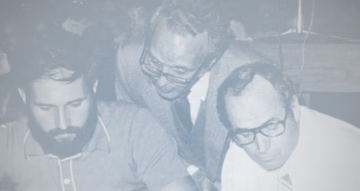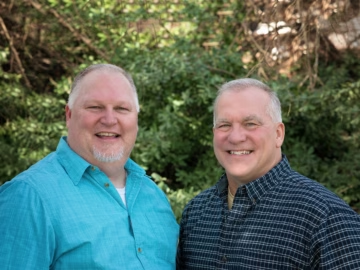
Reposted from Shalom! journal, this article was based on a sermon from David Flowers, senior pastor of Grantham Church, given on November 12, 2017. Listen to sermon audio.
Scripture Reading: Matthew 22:15-22; John 17:20-23; Ephesians 4:2-3
There really is nothing more divisive in this country and in the church today than politics.
If we let partisan politics cloud our vision, if we let allegiance to a flag and American political parties take precedence over our baptism and our unity in Christ, we are no different than those without Christ and we have absolutely nothing uniquely Kingdom to offer the world. Our ancient confession that “Jesus is Lord” must mean that Caesar (whether Republican or Democrat or something else) is not Lord.
In various places in the gospels, Jesus emphasizes his supremacy and his lordship over all things; in order to follow him, your love for him must be so great in comparison that it actually looks like you hate (or disregard) anything that competes for that love, loyalty, and allegiance.
When we make him our first love, everything else finds its proper place. Then we’re prepared to follow the Lamb that was slain and triumph with him over empire, as the book of Revelation calls us to do.
This is how we overcome.
Unfortunately, too often many folks in the church have wrongly assumed that we have no competing loyalties, no idols, no other love affairs that oppose and blind us to the truth. We often can’t see that we’ve become idol worshippers, identifying with our earthly citizenship, a political party, and a particular viewpoint so much that anyone who disagrees with us must be an enemy of all that is good. Which is, of course, why exile, in this case a post-Christian America, can aid us in seeing what Christians in the U.S. have for the most part not been able to see before.
Exile — that is, losing power and privilege and the Church being pushed to the periphery — will force us to reimagine the Church, to reevaluate our understanding of discipleship and what makes us Christians and unites us as the body of Christ. It will bring focus and clarity to who Christ is, who we are together, and what it means to live in the world but not be of the world. We must rise above the divisiveness brought on by fear, misinformation, and the widening gap of political parties, and discover a third way.
A third way should include unity in the body of Christ: “My prayer is not for them alone. I pray also for those who will believe in me through their message, that all of them may be one, Father, just as you are in me and I am in you. May they also be in us so that the world may believe that you have sent me. I have given them the glory that you gave me, that they may be one as we are one — I in them and you in me — so that they may be brought to complete unity. Then the world will know that you sent me and have loved them even as you have loved me.” (John 17:20-23).
Look at that: Jesus wants the same unity and oneness he shared with the Father, made possible by the Spirit, to be known in his Church. And notice that in his mind, if the power of this Trinitarian community isn’t experienced by his disciples, if they are not brought to complete unity and overcome their differences, the world will not believe in Christ and not know that God loves them.
Earlier, in John 13:34-35, Jesus said, “A new command I give you: Love one another. As I have loved you, so you must love one another. By this everyone will know that you are my disciples, if you love one another.” In other words, if we do not love each other with the love of Christ, and if we’re not united in that loyalty and love for Christ, then the flock will scatter and the world will never be able to believe, nor will people see the power of the gospel put on display through the local church. I am not saying that we have to agree on everything; I’m talking about unity and oneness despite our differing opinions.
The New Testament confession that “Jesus is Lord” was jam-packed full of meaning in the first century. It had all kinds of implications — personal, corporate, and socio-political.
How many times do the leaders of Israel try to pigeonhole Jesus?
They try to get him to reveal where he stands, so they can trap him and bring him down.
One time, they show him a coin and say, “Jesus, is it right to pay taxes or not?” This was an ongoing religious and political debate in Jesus’ day. Jews thought the “divine” Caesar’s face on a coin was idolatry, and yet they were expected to pay taxes with it, which would then go toward supporting the evils of the empire. If Jesus told them to rage against the machine, forget Caesar, and not pay the tax, he would be in trouble with Rome. His ministry would be over.
So he says, ”Give to Caesar what is Caesar’s (his face is on the coin, well give it back to him), but then give to God what is God’s (meaning, everything else belongs to him).” He chooses a third way out of this very political predicament.
During his temptations, Jesus explicitly rejects Satan’s offer to ascend to power and kingship through the kingdoms of the world, which the devil says he has authority over, and Jesus does not dispute. And by rejecting this path, Jesus shows us what kind of Messiah he is, and how his Kingdom will be established.
It will be by power-under, not by power-over.
It comes by dying, not by killing.
When Pilate asks if he is a king, Jesus says, “I am, but my kingdom is not of this world.”
He doesn’t mean that his Kingdom is out there somewhere in the clouds, far from earth, far from the pain, suffering, and the injustices of the world. No, while his Kingdom may not be of the world, his Kingdom is most definitely for this world. It just doesn’t come through coercion and force, by vengeance and violence, but by way of self-sacrificing love, by way of the cross.
Therefore, it is right for us to have a healthy suspicion of all kingdoms of the world, especially the ones that claim they are a city on a hill, a light to the nations, and the last great hope of the world. Those words must only be used to speak of Christ and his Church. Some good may come from the kingdoms of the world, but don’t put your trust in those kingdoms.
I recognize that some people sincerely want to work in the political arena because they care and understand that bad policies and unjust laws hurt and oppress people. But the church must never turn away from Christ’s calling to change the world by first making disciples and reconciling the world to God through transformative communal practices, as well as the innovative influence of the local church. Jesus put it in the DNA of the Church to be change agents. As Stanley Hauerwas has said, “The church doesn’t have a social strategy; the church is a social strategy.” In other words, we are the divinely appointed vehicle that is sent out to turn the world upside down.
If the state asks for your vote, and you can do it in good conscience, then by all means vote. If you feel called to work in government, insofar as you can faithfully obey the teachings of Jesus, try to do some good. Do as you feel led, but do not be deceived by the allure of politics because it is not the best way to make a difference in the world.
Ignorance of history, a lack of awareness of global Christianity, and a lack of imagination about what God can do through the local Church have often made us turn quickly to politics. We see the church failing or suffering from a poor imagination, and we turn to the methods of the kingdoms of the world.
We need fresh vision in the church to see what we can become.
We need the entrepreneurs and the innovators.
We need the doctors and the nurses, the school teachers, the accountants, the construction workers, and the lawyers.
We need you and your gifts to help us imagine great things and do them in your local congregation.
I like how Christena Cleveland put it in her book, Disunity in Christ: Uncovering the Hidden Forces that Keep Us Apart. She writes:
The body of Christ is vast, diverse, talented and brimming with resources. I wonder how many real-world issues we could tackle if we weren’t so busy bickering about the correct way to define a doctrine or which political party is better equipped to solve the crises in our country and beyond.
What if we decided that we were going to use our numbers, our expertise and our (potential) unity to solve real problems?
I love that. The “what if” calls us to re-imagine the way things could be. If we’re going to be a part of a new reformation, or even help lead out in this fresh move of the Spirit, then we must rediscover what it means to call Jesus Lord together, to love as he loved, and to be united in his eternal purpose.
To do that, we must be intentional about living out a third way of purposely pursuing a loving way to address injustice in our world and work for more of the Kingdom without mixing the gospel with partisan politics in the process. If we are a third way church, we grow and learn by loving and truly listening to others, we sharpen our focus and our passions on Christ, and we bear witness to the power of the gospel through a united Church.
Originally published for the fall 2018 issue of Shalom! A Journal for the Practice of Reconciliation



